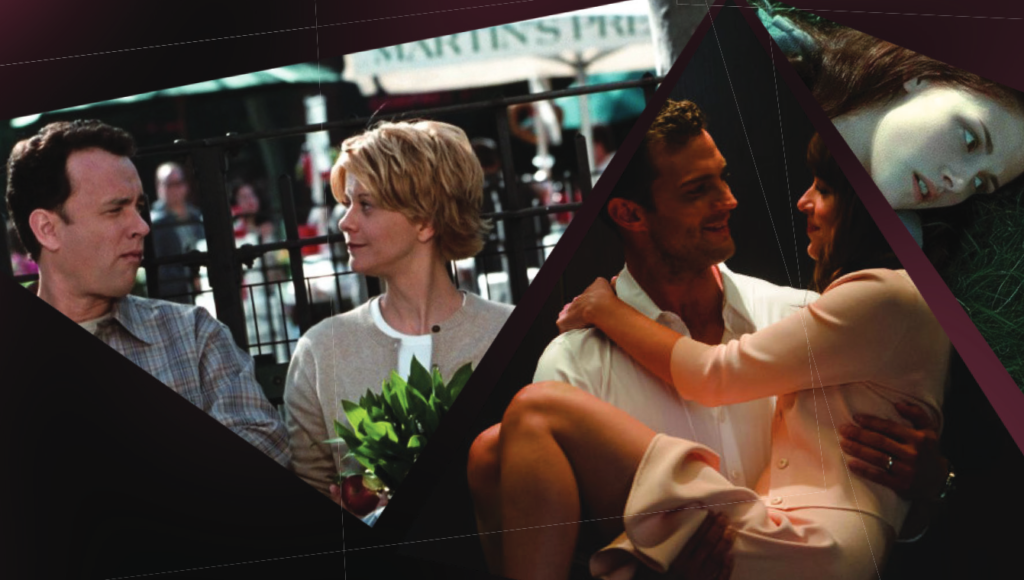Say someone has a crush on you. They relentlessly pursue you by following you, learning everything there is to know about you and then make a grand gesture without even knowing you. Sounds romantic, right? If you answered no, you are not alone. “Stalking for love” is a popular trope that can be seen in many romantic comedies including “Love, Actually,” “You’ve got Mail,” “Fifty Shades of Grey” and more.

Professor of women’s, gender and sexuality studies, Regina McMenomy, defines the idea of stalking for love and how it plays a significant role in film and TV.
“Stalking for love is basically the idea that it’s romantic to be a creep. It’s a pretty pervasive idea that infiltrates a lot of our romantic comedies. A lot of narratives we have are about the ‘nice guy,’ who is like a friendly guy, as opposed to the bad guy. But [the nice guy] doesn’t always get the girl and so the way he works his way into ‘wooing’ her or winning her over is by watching her,” McMenomy explained.
Freshman psychology major, Tessa Taylor, is a student in McMenomy’s women’s studies class where students analyze and discuss how the trope can affect someone’s idea of what love really means.
“It made me rethink modern things that are coming out because it’s a little more subtle, but it’s the same concept in a lot of our modern TV shows and movies. It’s not as obvious as standing outside with a sign serenading … But it made me think about how prevalent it is today,” Taylor said.
Taylor commented on how the film and TV industry has made these characters appealing in romantic comedies and how we often turn a blind eye to the red flags they present.

“I think it’s the distorted idea of loyalty. The importance of loyalty in a relationship, because that’s essentially what [the stalker] is seeking. These [characters] are seeking someone who will always love them because they are so dedicated. But that isn’t really dedication, it’s obsession,” Taylor explained.
Carol Siegel, professor of English and women’s, gender and sexuality studies, discussed how these movies and tropes can skew a woman’s idea of love at a young age. She also noted how individuals are often taught to ignore signs of mental and physical abuse and interpret them as love.
“Women who are in abusive relationships often suffer from Stockholm Syndrome. They begin to think that the abuser’s behavior is love because that’s what he says,” Siegel said.
Highlighting specific movies including, “Twilight” and “Fifty Shades of Grey,” Seigal explained that these films reflect and even glamorize abusive relationships.
“People learn to interpret these things as pleasure. I think we have tons of that about sexuality. If a guy is constantly stalking you, following you, won’t leave you alone or hurting you physically … You’re supposed to think, just like we’re told in elementary school, that means he likes you. We’re told you should be proud and grateful that you’re getting all this male attention,” – Carol Siegel

McMenomy offered insight into how healthy relationships might be portrayed in the media.
“I think the whole thing that we gloss over with so many of our narratives, is that you never have certainty. You never have a relationship that’s going to be what we’re trying to paint with romantic comedies. So, if we could get to a point where we want to see growth, support and equal connection, then perhaps we could get to a point where these narratives support us,” McMenomy said.
Siegel emphasized that we should focus on platonic and unselfish love.
“I think we need to focus on building these strong loving platonic relationships. Friendships, relationships with children, relations with pets, if you love animals, then animal companions. Those are the relationships that teach you what love is, what unselfish real love is,” Siegal said.

Emily is a senior studying integrated strategic communication at WSU Vancouver.
